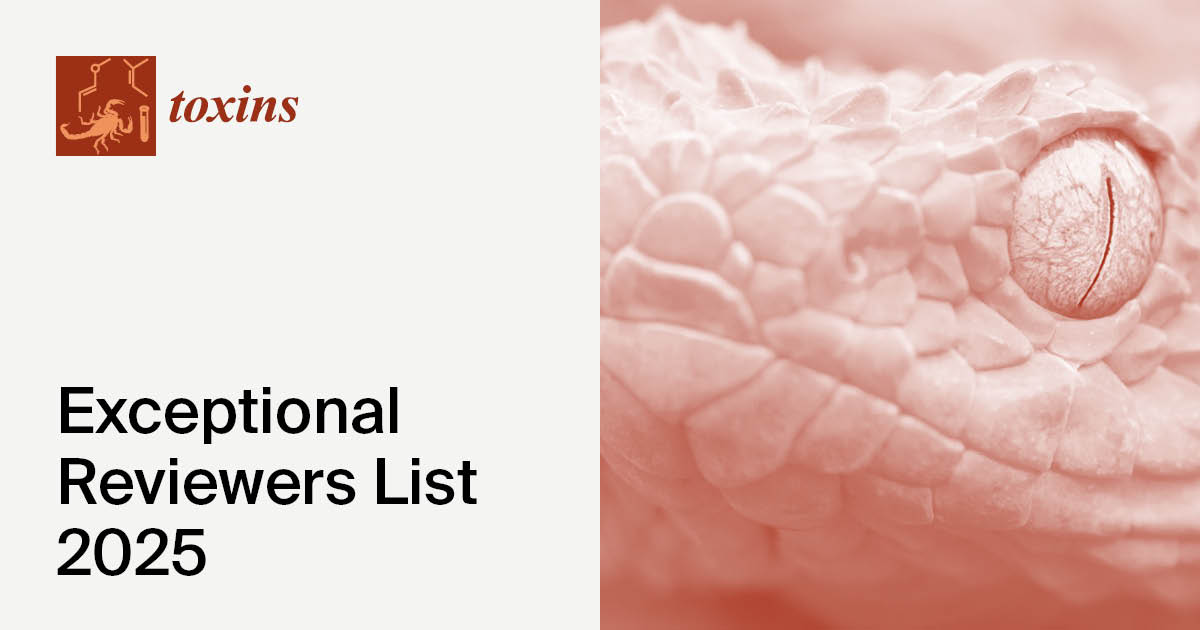
Toxins Exceptional Reviewers List 2025
We are thrilled to share the updated Exceptional Reviewers List 2025. This program was designed to recognize and honor scholars who have delivered consistently exceptional review reports to our journal. Committed to fostering rigorous research and promoting knowledge exchange, Toxins (ISSN: 2072-6651) recognizes the significant role our reviewers play in maintaining the quality and integrity of the articles we publish. According to latest surveys conducted in 2024, 92% of our authors rate the peer review as good or excellent, thanks to our pool of excellent reviewers.
We would like to express our sincere appreciation to all the reviewers who have generously volunteered their time and expertise to assist in Toxins’ peer-review process. Their dedication and attention to detail in evaluating manuscripts, offering valuable feedback, and contributing to academic rigor are truly commendable.
The Exceptional Reviewers List was introduced in November 2024. Each quarter, we will be selecting a group of outstanding reviewers and will introduce them here.
Q1:
Name: Dr. Jeffrey Ira Everitt
Affiliation: Department of Pathology, Duke University Medical Center, Durham, NC
27710, USA
Interests: animal ethics; pathology; veterinary
Name: Dr. Dany Domínguez Pérez
Affiliation: Department of Biology and Evolution of Marine Organisms (BEOM), Stazione Zoologica Anton Dohrn, Villa Comunale, 80121 Naples, Italy
Interests: toxins; animal venoms; marine and fresh toxins; OMICs; biodiscovery; bioinformatics; transcriptomics; proteomics; toxicology; bioactive peptides
“I am deeply honored to have been selected among the exceptional reviewers for Toxins. Serving as a reviewer for this journal has been a truly rewarding experience, allowing me to engage with high-quality manuscripts across diverse areas, particularly in animal toxins and biotoxins. I value Toxins' efficient and friendly editorial process, which offers authors and reviewers a transparent and accessible platform. The journal’s double-blind peer-review system ensures rigorous and unbiased evaluations by concealing identities, maintaining fairness and integrity.”
In today’s fast-paced scientific environment, where research outputs and data generation accelerate and studies can quickly become outdated, Toxins strikes a crucial balance between maintaining high-quality standards and ensuring timely publication. The journal’s flexible format is a significant advantage, enabling researchers to publish both extensive and comprehensive works, including numerous figures, tables, and supplementary materials, thus addressing the needs of modern data-driven research.
Toxins' open-access model facilitates broad dissemination and provides opportunities for researchers to launch Special Issues with strong editorial support. It has been a pleasure to contribute to the journal’s efforts, and I look forward to continuing to support its mission of promoting excellence in toxin research.
Q2
Name: Dr. Ronald A. Jenner
Affiliation: Department of Life Sciences, The Natural History Museum, Cromwell Road,
London SW7 5BD, UK
Interests: molecular evolution of animal venoms and toxins; phylogenetics of toxins; venom gland transcriptomics
Name: Prof. Dr. Karel Everaert
Affiliation: Department of Urology, ERN eUROGEN Accredited Centre, University
Hospital Ghent, 9000 Ghent, Belgium
Interests: nocturia; oab; incontinence; urinary catheters; urinary incontinence; urology
We are thrilled to share the updated Exceptional Reviewers List 2025. This program was designed to recognize and honor scholars who have delivered consistently exceptional review reports to our journal. Committed to fostering rigorous research and promoting knowledge exchange, Toxins (ISSN: 2072-6651) recognizes the significant role our reviewers play in maintaining the quality and integrity of the articles we publish. According to surveys conducted in 2024, 92% of our authors rate the peer review as good or excellent, thanks to our pool of excellent reviewers.
We would like to express our sincere appreciation to all the reviewers who have generously volunteered their time and expertise to assist in Toxins’ peer-review process. Their dedication and attention to detail in evaluating manuscripts, offering valuable feedback, and contributing to academic rigor are truly commendable.
The Exceptional Reviewers List was introduced in November 2024. Each quarter, we will be selecting a group of outstanding reviewers and will introduce them here.
Q3
Name: Dr. Luca-Liviu Rus
Affiliation: Preclinic Department, Faculty of Medicine, “Lucian Blaga” University of
Sibiu, 2A Lucian Blaga Str., 550169 Sibiu, Romania
Interests: analytical method development and validation; quality control of health products; drug delivery; cosmetics; nutricosmetics nutraceuticals
Name: Dr. Pedro Infante-Cossio
Affiliation: Department of Surgery, School of Medicine, University of Seville, 41009 Seville, Spain
Interests: facial; maxillar; temporomandibular joint
